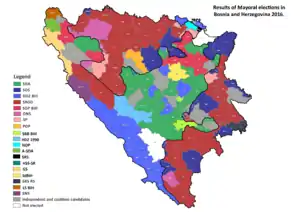2016 Bosnian municipal elections
Municipal elections were held in Bosnia and Herzegovina on 2 October 2016.
| |||||||||||||||||||||||||||||||||||||
| Registered | 3,179,720 | ||||||||||||||||||||||||||||||||||||
|---|---|---|---|---|---|---|---|---|---|---|---|---|---|---|---|---|---|---|---|---|---|---|---|---|---|---|---|---|---|---|---|---|---|---|---|---|---|
| Turnout | 53,88% | ||||||||||||||||||||||||||||||||||||
| |||||||||||||||||||||||||||||||||||||
 | |||||||||||||||||||||||||||||||||||||
 |
|---|
| This article is part of a series on the politics and government of Bosnia and Herzegovina |
|
|
A total of 3,263,906 voters were registered in the Central Voters’ Register, including 65,111 by-mail voters. Around 25,000 citizens voted at polling stations in diplomatic representations abroad.[1]
30,000 candidates were contesting the election for 2,835 local councillors, 301 city councillors, 131 municipal mayors and 12 city majors.[2]
The Central Electoral Commission registered a total of 3,179,720 persons eligible to vote (excluding Stolac); 1,739,756 votes were cast, of which 1,635,602 (94.01%) valid, and 104,154 (5.99%) invalid.[3]
Summary
Local elections took place in a rather heated political environment, being preceded by one week by an illegal referendum in the Republika Srpska entity on the 9 January holiday, which had been declared unconstitutional by the Constitutional Court. Although the same Court declared the referendum null and void, it took place equally. The political discourse in the pre-electoral period focus on ethno-national issues rather than local administration.[1]
Voting took place regularly and without major incidents. For the first time, a 40% gender quota was applied to candidate lists; however, only seven women were elected as mayor out of 143. Some irregularities in the electoral process were reported, including as regards inflated voters' lists and the politicisation of electoral administration. No elections could be held in Mostar, for the second time in a row. Elections in Stolac were suspending following violent incidents and later repeated on 19 February.[1][4][5]
Results
By municipality
By party
| Party | Mayors in 2012 | Mayors in 2016 | +/- |
|---|---|---|---|
| Party of Democratic Action | 37 | 32 | |
| Croatian Democratic Union of Bosnia and Herzegovina | 13 | 19 | |
| Social Democratic Party of Bosnia and Herzegovina | 10 | 8 | |
| Croatian Democratic Union 1990 | 3 | 2 | |
| Alliance of Independent Social Democrats | 3 | 2 | |
| Union for a Better Future of BiH | 2 | 1 | |
| Civic Alliance | / | 1 | |
| Party for Bosnia and Herzegovina | 0 | 1 | |
| Party of Democratic Activity | 1 | 1 | |
| Labour Party of Bosnia and Herzegovina | / | 1 | |
| Serbian Progressive Party | 0 | 1 | |
| Croatian Peasant Party of Stjepan Radić | 0 | 1 | |
| Independents | 10 | 12 |
By municipality
By party
| Party | Mayors elected in 2012 elections | Mayors elected in 2016 elections | +/- |
|---|---|---|---|
| Alliance of Independent Social Democrats | 17 | 30 | |
| Serb Democratic Party | 32 | 16 | |
| Democratic People's Alliance | 2 | 5 | |
| Socialist Party | 0 | 4 | |
| Party of Democratic Progress | 1 | 1 | |
| National Democratic Movement | / | 1 | |
| Serbian Radical Party of Republika Srpska | 1 | 1 | |
| Serb Radical Party | / | 1 | |
| Independents and coalitions | 3 | 4 |
Assembly of Brčko District
| Constituency[11] | Council[12] | Mayor[13] elected by Council | ||||||||
|---|---|---|---|---|---|---|---|---|---|---|
| Party | Popular vote | % | Seats | Mayor | Votes | % | ||||
| Brčko | Serb Democratic Party—National Democratic Movement | 5,908 | 15.06 | 5 | Siniša Milić, SNSD | 21 | 68% | |||
| Alliance of Independent Social Democrats | 5,512 | 14.05 | 4 | |||||||
| Party of Democratic Action | 4,989 | 12.72 | 4 | |||||||
| Croatian Democratic Union | 3,940 | 10.04 | 3 | |||||||
| Brčko Democratic Movement | 3,247 | 8.28 | 2 | |||||||
| Party of Democratic Progress—Progressive Srpska | 2,754 | 7.02 | 2 | |||||||
| Croatian Peasant Party of Stjepan Radić | 2,335 | 5.95 | 2 | |||||||
| Union for a Better Future of BiH | 2,049 | 5.22 | 2 | |||||||
| Social Democratic Party | 2,045[14] | 5.21 | 3[15] | |||||||
| Party for Bosnia and Herzegovina | 1,780 | 4.54 | 1 | |||||||
| Socialist Party | 1,773 | 4.52 | 1 | |||||||
| Democratic Front | 1,312 | 3.34 | 1 | |||||||
| Minority candidate Ćazim Dačaj | (384) | - | 1 | |||||||
| Total | 41,772 | 31 | ||||||||
References
- Council of Europe, Congress of Local and Regional Authorities, Observation of local elections in Bosnia and Herzegovina, 2016 - Report CG32(2017)16final
- Dodik's referendum – opening Pandora's box in the Balkans?, IFIMES, 17 September 2016
- Central Electoral Commission, 2016 elections
- Stolac
- Pod Lupom, 2016 Elections in Stolac]
- Supported by SDA-SBB coalition.
- Supported by HDZ-HSS SR coalition.
- Supported by SDP-DF coalition.
- Election was suspended on October 2 after incidents and subsequently repeated on 19 February 2017.
- Supported by HDZ-HDZ 1990-HSS SR coalition.
- The three-digit numbers in the municipality column are the codes used for the municipalities on the Central Electoral Commission site
- (in Croatian)Council results from Central Electoral Commission site
- (in Croatian)Major of Brčko Archived 2018-06-19 at the Wayback Machine
- additional 531 votes from minority constituency
- including one minority candidate
External links
- Council of Europe, Congress of Local and Regional Authorities, Observation of local elections in Bosnia and Herzegovina, 2016 - Report CG32(2017)16final